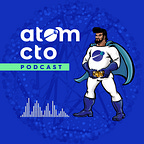In this episode of the Atom CTO podcast we’re talking with Mark Herschberg, an MIT instructor, fractional CTO, and author of "The Career Toolkit." Our discussion delves into the evolving role of the Chief Technology Officer (CTO) and we provide valuable insights for aspiring CTOs and business owners looking to hire them.
This article distils the key points from our conversation, offering practical advice and strategies for those navigating the path to becoming a CTO.
The Changing Role of the CTO
The role of the CTO has evolved significantly over the years. Traditionally seen as a purely technical position, today's CTOs are strategic leaders who align technology with business goals. They are deeply involved in decision-making processes, bridging the gap between technical teams and business operations. As we discuss, understanding this evolution is crucial for anyone aspiring to become a CTO or looking to hire one.
Key Skills and Experience Needed to Become a CTO
Technical Proficiency and Beyond: While technical expertise is essential, aspiring CTOs must also develop skills in project management, business strategy, and people management. Mark emphasizes the need to understand broader business concepts, such as finance and marketing, to effectively bridge the gap between technology and business needs.
Consulting as a Learning Path: Consulting can be a valuable stepping stone for aspiring CTOs. It offers exposure to various industries and business functions, helping develop a comprehensive understanding of how different parts of a business operate and how technology can support them.
Mentorship and Networking: Building relationships with mentors and leveraging professional networks are crucial for guidance and new opportunities. Mark benefited from mentors who were recruiters, executives, and community members from his MIT fraternity, highlighting the value of a strong support network.
Some of the Challenges CTO’s Face
Cultural Fit and Recruitment: One of Mark's early mistakes was hiring a technically proficient developer who was not a good cultural fit for a start-up environment. Understanding the cultural and team dynamics is crucial when hiring to ensure long-term success and employee satisfaction.
Politics and People Management: Navigating organizational politics and managing teams effectively are significant challenges. Mark shared his experience of hiring a developer from a big bank who struggled with the startup's self-organizing team culture, underscoring the importance of assessing both technical and cultural fit.
Strategic Thinking and Adaptability
As CTOs climb the ranks, their role shifts from being operational to strategic. This transition involves managing day-to-day technical tasks and thinking several steps ahead, understanding market dynamics, and making decisions that align with long-term business goals. Mark's background in competitive chess helped him develop this strategic mindset, demonstrating the value of strategic thinking in the CTO role.
The Future of the CTO Role
The CTO role is continually evolving. Some companies are adopting the title of Chief Technology and Product Officer (CTPO) to reflect the integrated responsibilities of overseeing both technology and product development. This trend is particularly relevant in highly technical fields like cybersecurity, where deep technical expertise is essential for product innovation.
Advice for Aspiring CTOs
Create a Career Plan: Just as businesses have project plans, aspiring CTOs should develop a career plan that outlines their goals and the steps needed to achieve them. This plan should be flexible, allowing for adjustments as they gain experience and insights.
Continuous Learning: Staying current with technological trends and business practices is essential. Engaging in peer learning groups, reading industry blogs, and participating in professional communities can help CTOs keep their knowledge up-to-date.
Holistic Understanding: While deep technical knowledge is vital, having a holistic understanding of the business and its various functions will make a CTO more effective in their role. This includes having a basic grasp of finance, sales, and marketing to better align technology with business objectives.
Finding and Hiring the Right CTO
For business owners looking to hire a CTO, understanding the specific needs of your business is crucial. The role of a CTO can vary widely depending on the company's size and industry. Here are some key considerations:
Assess Your Needs: Determine whether you need a hands-on technical expert or a strategic leader. Smaller companies might require a CTO who can code and manage a small team, while larger organizations need someone to oversee vast teams and complex projects.
Look for a Cultural Fit: Ensure that the candidate aligns with your company's culture. A good cultural fit can significantly impact team cohesion and productivity.
Use a Trusted Network: If you lack the technical expertise to assess candidates, rely on your network. Seek help from trusted recruiters, industry peers, or technical advisors to find the right fit.
The Dark Sides of Being a CTO
The CTO role comes with its challenges, including politics, burnout, and isolation. Navigating these issues requires resilience and a proactive approach:
Managing Politics: Organizational politics can be exhausting. Developing strong people skills and building alliances within the company can help mitigate political challenges.
Avoiding Burnout: Long hours and high pressure can lead to burnout. It's essential to find a balance between work and personal life, delegate effectively, and take breaks to recharge.
Combatting Isolation: CTOs can often feel isolated, especially when they are the sole technical voice in the executive team. Engaging with peer groups and maintaining a robust professional network can provide much-needed support and perspective.
Conclusion
The journey to becoming a CTO is challenging but immensely rewarding. Whether you're an aspiring CTO or a business owner looking to hire one, understanding the evolving nature of the role, the skills required, and the challenges faced can significantly enhance your approach and success. As Bhairav and Mark's discussion highlights, continuous learning, strategic thinking, and strong networking are crucial components for anyone looking to thrive in this pivotal role.










